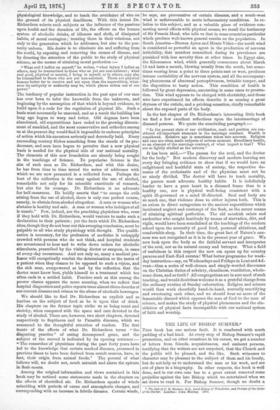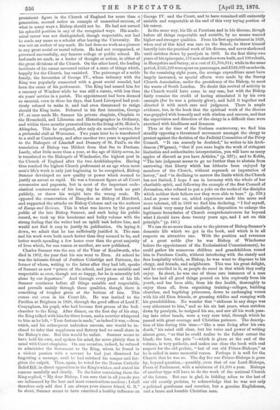THE LIFE OF BISHOP SUMNER.*
THIS book has one serious fault. It is cumbered with much padding of a bad kind. At every step of Bishop Sumner's rapid promotion, and on other occasions in his career, we get a number of letters from friends, acquaintances, and eminent persons, testifying that the writers are not surprised, that the Church and the public will be pleased, and the like. Such witnesses to character may be pleasant to the subject of them and his family, but do not help us to understand the man or his work, and are out of place in a biography. In other respects, the book is welt done, and in our own case has to a great extent removed some prejudice against the late Bishop which we entertained when we sat down to read it. For Bishop Sumner, though no doubt a * The Life of C. R. Sumner, AD., Lord Bithop of Winchester, and Prelate of the Order of the Garter. London: John Murray. 1876. prominent figure in the Church of England for more than a generation, seemed rather an example of unmerited success, of what in many ways a Bishop should not be. He had not earned his splendid position in any of the recognised ways. His acade- mical career was not distinguished, though respectable, nor had he made any name as a scholar after leaving the University. He was not an author of any mark. He had done no work as a pioneer in any great social or moral reform. He had not reorganised, or governed successfully, any famous college or public schooL He had made no mark, as a leader of thought or action, in either of the great divisions of the Church. On the other hand, the leading incidents of his career savoured rather of a state of things which, happily for the Church, has vanished. The patronage of a noble family, the favourites of George IV., whose intimacy with the King was popularly connected with a great social scandal, had been the cause of his perferment. The King had named him for a canonry of Windsor while he was still a curate, with less than aix years' service in a parish. The appointment had been deemed so unusual, even in those lax days, that Lord Liverpool had posi- tively refused to make it, and had even threatened to resign should the King insist. Defeated in his first intention, George IV. at once made Mr. Sumner his private chaplain, Chaplain to the Household, and Librarian and Historiographer in Ordinary, and within three months presented him to the living of St. Helen's, Abingdon. This he resigned, after only six months' service, for a prebendal stall at Worcester. Two years later he is transferred to a stall at Canterbury, and after another two years is appointed to the Bishopric of Llandaff and Deanery of St. Paul's, on the translation of Bishop van Mildert from that See to Durham. Lastly, after little more than a year, at the age of thirty-seven, he is translated to the Bishopric of Winchester, the highest post in the Church of England after the two Archbishoprics. Having 'thus reached the highest Church preferment at an age when moat men's life's work is only just beginning to be recognised, Bishop Sumner developed no new quality or power which seemed to justify an ascent so rapid. He was a foremost figure at all Court ceremonies and pageants, but in moat of the important eccle- siastical controversies of his long day he either took no part publicly, or threw his weight into the wrong scale. He opposed the consecration of Hampden as Bishop of Hereford, and supported the attacks on Bishop Colenso and on the authors • of Essays and Reviews. This is what was known by the general public of the late Bishop Sumner, and such being his public record, we took up this handsome and bulky volume with the strong feeling that the writer had an uphill task before him, and would not find it easy to justify its publication. On laying it down, we admit that he has sufficiently justified it. The man and his work were both much better than they seemed to be, and better worth spending a few hours over than the great majority of lives which, for one reason or another, are now published.
Charles Sumner was the son of the Vicar of Kenilworth, who died in 1802, the year that his son went to Eton. At school he was the intimate friend of Justices Coleridge and Patteson, the former of whom, writing to the latter after they had left, speaks of Sumner as now "prince of the school, and just as amiable and respectable as ever, though not so happy, for he is miserably left alone by our departure." And through every phase of his life Sumner continues before all things amiable and respectable, and prevails mainly through these qualities, though there is something of tougher grain at the bottom of him. This comes out even in his Court life. He was invited to the Pavilion at Brighton in 1820, through the good offices of Lord F. Conyngham, his pupil, who had become first groom of the bed- .chamber to the King. After dinner, on the first day of his stay, the King talked with him for three hours, and a courtier whispered to him as he left, " Your fortune is made," as indeed it was,—from which, and his subsequent unbroken success, one would be in- clined to infer that suppleness and flattery had no small share in the Bishop's rise. But this would be unfair. Sumner seems to have held his own, and spoken his mind, far more plainly than is usual with Court chaplains. On one occasion, indeed, he refused to administer the Sacrament to the King, whom he found in a violent passion with a servant he had just dismissed for forgetting a message, until he had subdued his temper and for- given the culprit. Then, again, he voted for the Roman Catholic Relief BA in direct opposition to the King's wishes, and stated his reasons manfully and clearly. To the letter containing them the King replied, " My dear Bishop, I am sure that in all you do you are influenced by the best and most conscientious motives ; I shall therefore only add that I am always your sincere friend, G. R." In short, Sumner seems to have exercised a healthy influence on
George IV. and the Court, and to have remained still eminently amiable and respectable at the end of this very trying portion of his career.
In the same way, his life at Farnham and in his diocese, though before all things respectable and amiable, by no means wanted higher and stronger qualities. From his first appointment in 1828, when zeal of this kind was rare on the Bench, he threw himself heartily into the practical work of his diocese, and never slackened until stricken down by paralysis in 1869. In the first thirty-two years of his episcopate, 176 new churches were built, and 100 rebuilt, in Hampshire and Surrey, at a coat of £1,704,914; while in the same period, £525,229 were spent on parsonages, and £522,039 on schools. In the remaining eight years, the average expenditure must have largely increased, as special efforts were made by the Surrey Church Association, under the presidency of the Bishop, to meet the wants of South London. No doubt this revival of activity in the Church would have come in any case, but with the Bishop fairly remains the credit of having stimulated it by his own example (for he was a princely giver), and held it together and directed it with much care and judgment. There is ample evidence, too, in the book that the spiritual work of the diocese was grappled with honestly and with wisdom and success, and that the supervision and direction of the clergy in a difficult time were exercised with kindliness and firmness.
Thus at the time of the Gorham controversy, we find him steadily opposing a threatened movement amongst the clergy to protest against the decision of the Judicial Committee of the Privy Council. " It can scarcely be doubted," he writes to his Arch- deacon (Wigram), "that if you once begin the work of stringent' limitation and authoritative interpretation, you will have as many apples of discord as you have Articles," (p. 337) ; and to Keble, "The late judgment seems to go no further than to abstain from narrowing that liberty which has hitherto been enjoyed by members of the Church, without reproach or imputation of heresy," and "in declining to narrow the limits which the Church has not limited, I hope I am in harmony with the whole of her charitable spirit, and following the example of the first Council of Jerusalem, who refused to put a yoke on the necks of the disciples which neither their fathers nor they were able to bear." (p. 339.) And as years went on, added experience made him more and more tolerant, till in 1866 we find him declaring, " I feel myself, and think very many feel similarly, a disposition to enlarge the legitimate boundaries of Church comprehensiveness far beyond what I. should have done twenty years ago, and I act on this principle." (p. 440.) We can do no more than refer to the picture of Bishop Sumner's domestic life which we get in the book, and which is in all respects an attractive one. With the position and revenues of a great noble (for he was Bishop of Winchester before the appointment of the Ecclesiastical Commissioners), he could gather his numerous children and grandchildren round him in Farnham Castle, without interfering with the stately and free hospitality which, as Bishop, he was wont to dispense to his clergy, and friends, and neighbours. This was his great delight, and he excelled in it, as people do excel in that which they really enjoy. In short, he was one of those rare instances of a man who has had all good things poured on him copiously from his youth, and has been able, from his fine health, thoroughly to enjoy them all, from organising training- colleges, building churches, and baptising princesses, down to exchanging verses with his old Eton friends, or guessing riddles and romping with his grandchildren. No wonder that " sickness in any shape was very abhorrent to him," and so his six last years, when stricken down by paralysis, he resigned his see, and saw all his work pass- ing into other hands, were a very sore trial, through which he passed with great courage and Christian patience. The descrip- tion of him during this time—" like a man living after his own death," his mind still clear, but his voice and power of writing almost gone, " so that he could realise to the fullest extent the blank, the loss, the pain "—which is given at the end of the volume, is very pathetic, and makes one close the book with real respect for the old prelate, " last of our old Prince-Bishops," as he is called in some memorial verses. Perhaps it is well for the Church that he was so. The day for our Prince-Bishops is gone by, beyond question,—possibly, even that of our Lord-Bishops, Peers of Parliament, with a minimum of £4,500 a year. Bishops of another type will have to do the work of the national Church of the future. But one is glad, in bidding adieu to the last of our old courtly prelates, to acknowledge that he was not only la polished gentleman and courtier, but a genuine Englishman, and a brave and humble Christian man.































 Previous page
Previous page